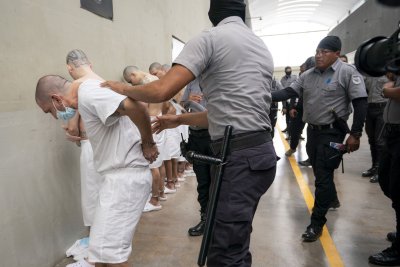April 14 (UPI) — The American Civil Liberties Union filed a third lawsuit Saturday over the Trump administration’s use of a wartime statute to deport migrants from Venezuela to El Salvador.
Brought in Federal District Court in Colorado, it follows similar legal challenges filed by the ACLU in Texas and New York on behalf of two men who allege they have been wrongly accused by the administration of being members of the Venezuelan gang Tren de Aragua.
The Colorado plaintiffs have only been identified in court papers by their initials, D.B.U. and R.M.M. and both a temporary restraining order and a writ of habeas corpus were filed for them by the ACLU.
D.B.U. was reportedly arrested in January at a function that law enforcement agents allege was a Tren de Aragua party, but D.B.U denies being a member of the gang.
R.M.M. was arrested in March by federal agents who purport he was present with three other Hispanic men near their vehicles outside a home in Colorado that was under investigation into Tren de Aragua. R.M.M. also claims to be unaffiliated with the gang and was allegedly present only to meet with someone interested in buying his car.
The Trump organization has used the Alien Enemies Act to deport more than 100 Venezuelan immigrants accused of belonging to Tren de Aragua to the CECOT, a prison in El Salvador, an act used only three times since its passage in 1798. The ACLU has since begun fighting Trump’s use of the act, with its first challenge filed in Washington. The federal judge in charge of the case had issued a temporary order to stop the deportation flights to El Salvador, due to concerns that those arrested had no way to properly contest whether they were truly members of the gang.
A federal appeals court concurred with that judge, and then the U.S. Supreme Court ruled last week that any immigrant subject to deportation under the act needed to be given notice before being deported so that they could challenge the process in court. However, those challenges were required to take place in the location of their detention.
The ACLU has since responded with actions in Texas, New York and Colorado where Venezuelans subject to Trump’s use of the Alien Enemies Act are currently located. Lawsuits filed on their behalf have kept these accused individuals in the U.S. until any related legal questions involving the administration’s use of the act have been resolved.
